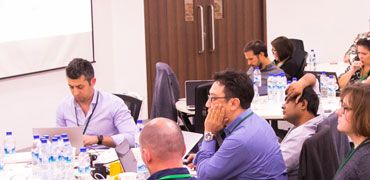What are People Management Skills? How Important are They at the Workplace?

Are you looking to improve your people management skills and galvanize your team toward better outcomes? You are not alone. The abilities required to lead and inspire teams are not always naturally-endowed. They need to be honed. According to a report by Gallup, only one in 10 workers has the innate talent to be a good manager—even after receiving specialized training! Let’s explore the wide gamut of people management skills and the techniques you’ll need to foster these abilities in you and your team members.
What are People Management Skills?
People management skills are a set of competencies and abilities that enable leaders and managers to work with and lead their team members effectively. Here are 21 essential people management skills to help you succeed in a leadership role:
Communication
This is a foundational skill. Effective communication enables managers to convey their thoughts, ideas, and expectations to team members in a clear and succinct manner.
Active Listening
This critical skill entails concentrating on the person speaking, clarifying doubts, and responding appropriately. It helps build trust, foster empathy, and avoid misunderstandings.
 Conflict Resolution
Conflict Resolution
Conflicts are unavoidable in any workplace. Your responsibility as a manager is to identify and resolve them with patience, and empathy, and negotiate to find common ground.
Emotional Intelligence
Managers need to possess a high level of emotional intelligence. The goal here is to connect with your team members, inspire trust, manage your emotions as well as those of others, and create a positive work environment.
Empathy
Empathy is the ability to understand and share the emotions and viewpoints of others. Managers who empathize build better rapport, trust, and a sense of belonging.
Flexibility
As a manager, you must be adaptable enough to meet the needs and preferences of your team members and adjust your management style accordingly.
Goal-Setting
Specific, measurable, and attainable objectives are necessary to keep the team motivated: It aligns their efforts with the organization’s objectives and allows you to track progress.
Delegation
The art of assigning tasks and responsibilities to team members based on their strengths and expertise is known as delegation. It not only empowers your team members but also frees up your time to help you focus on more important tasks.
Motivation
Managers can motivate their team members by providing them with valuable feedback, recognition, and opportunities for growth.
Coaching
This is all about providing constructive feedback, guidance, and support to individuals. Coaching your team members promotes self-awareness, skill development, and continuous improvement.
Time Management
Effectively prioritizing, planning, and allocating time is essential if you want to balance your workload as a manager. It helps you meet deadlines and achieve goals.
Decision-Making
The ability to make informed, rational, and timely decisions is referred to as decision-making. When you make effective decisions, you avoid conflicts, save time, and achieve organizational goals.
Problem-Solving
Managers need to be good at problem-solving. When you solve problems effectively, you avoid delays, reduce risks, and improve the performance of your team.
Creativity
The ability to think outside the box, generate innovative ideas, and create new opportunities is referred to as creativity. It encourages experimentation and drives growth among your team members.
Team Building
Trust, collaboration, and positivity are the hallmarks of team building. It helps foster a sense of belonging, encourages innovation, and propels the team to achieve common goals.
Leadership
This is given: Managers must be able to guide, inspire, and influence their team members with a clear vision. They must also lead by example.
ALSO READ: What is Executive Presence and Why Every Leader Needs it
Strategic Thinking
The ability to analyze complex problems, identify opportunities, and develop long-term plans is referred to as strategic thinking. It allows you to make informed decisions, allocate resources effectively, and drive growth.
Interpersonal Skills
The ability to communicate, collaborate, and form relationships with others comes in handy if you want to build trust, respect, and rapport with your team members.
Mentoring
Managers need to function as mentors if they want to promote learning and advance the careers of their team members. This often involves providing guidance, feedback, and support for their team’s professional development.
Performance Management
It is the process of setting expectations, monitoring progress, and providing feedback to team members in order to improve their performance. When you effectively manage performance, you motivate team members, increase productivity, and achieve the organization’s objectives.
Diversity and Inclusion
Diversity and inclusion are workplace principles that promote and value differences. A manager must embrace diversity and inclusion to create a welcoming environment for all team members. They should also promote fairness and equity.
ALSO READ: What is Autocratic Leadership & How Does it Work in a Business Environment?
People Manager Vs. Leaders

These two terms are often used interchangeably but they have distinctly different connotations—although the overall purpose of leading is the same. People managers oversee their team’s day-to-day operations and ensure projects are completed on time and within budget. They provide team members with guidance, support, and feedback, as well as address any performance issues that may arise. They are also responsible for ensuring team members have the resources they need to succeed. Leaders, on the other hand, are in charge of developing the organization’s overall strategy and vision. They inspire and motivate their teams to achieve the company’s vision and foster an environment of innovation and collaboration. Leaders are responsible for driving growth and success by developing relationships with stakeholders inside and outside the organization.
ALSO READ: What is Transformational Leadership and Why is it Important?
How to Learn People Management Skills
One of the best ways to develop people management skills is by learning through resources—books, online courses, and workshops, among others—that focus on leadership and communication. Observe effective managers in your organization, as well as solicit feedback from your own team members, to identify areas for improvement. You can also practice active listening, effective communication, and empathy in your daily interactions. Look for opportunities to lead and manage small projects or teams. And finally, don’t be afraid to make mistakes and learn from them; invest in your own personal and professional development on a regular basis.
Learning People Skills with Emeritus
Emeritus offers some world-class courses on leadership and people management, such as:
- Columbia Management Essentials (Online) from Columbia Business School: This is a 3-month online course, that runs for 6-8 hours per week
- Berkeley Technology Leadership Program by Berkeley ExecEd: Berkeley’s program is a 6-month online course that requires 4-6 hours per week
- Cambridge Senior Management Programme by the University of Cambridge: This is a 7-month course that’s available both online and in-person
To conclude, mastering people management skills is essential for success in a complex and fast-evolving business environment. You can improve as a leader, forge closer bonds with your team, and promote organizational success by investing in your own professional growth and adopting a proactive learning strategy. Start by enrolling in Emeritus’ online leadership courses to help you realize your full potential as a leader.
Write to us at content@emeritus.org





































































































